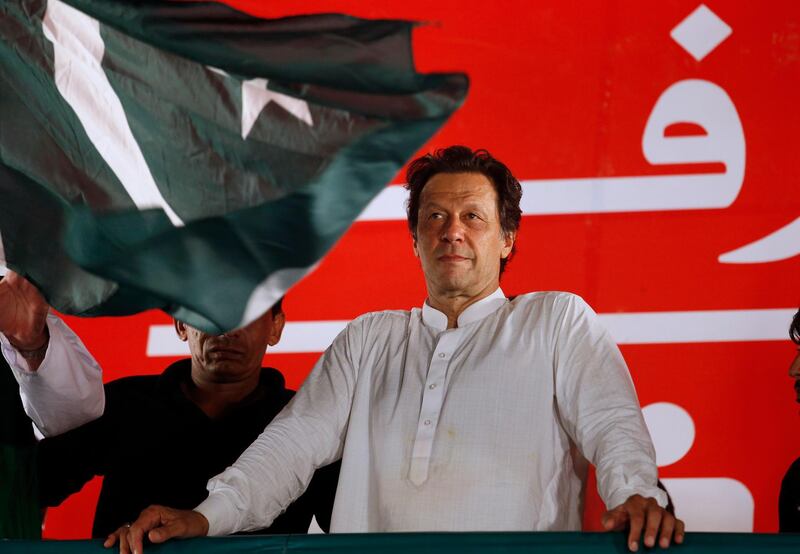Pakistan will do everything in its power to bring peace to Afghanistan, Prime Minister Imran Khan vowed on Tuesday, as he said his country was brokering talks between American and Taliban envoys.
"Pakistan has helped in the dialogue between Taliban and the US in Abu Dhabi. Let us pray that this leads to peace and ends almost three decades of suffering of the brave Afghan people. Pakistan will be doing everything within its power to further the peace process," he tweeted.
Pakistan has helped in the dialogue between Taliban and the US in Abu Dhabi. Let us pray that this leads to peace and ends almost three decades of suffering of the brave Afghan people. Pakistan will be doing everything within its power to further the peace process.
— Imran Khan (@ImranKhanPTI) December 18, 2018
After a first day of discussions in Abu Dhabi, Taliban militants said they had held “extensive rounds of meetings” with US officials on the withdrawal of American troops.
The three-day meeting which began on Monday appeared to mark a significant shift for Islamabad, which has long been accused of granting the Taliban safe havens and not doing enough to end the Afghan conflict.
Yet the difficulties of progress were underlined when the Taliban delegation continued to refuse to talk to Afghan government negotiators on the sidelines of the meeting.
A Taliban delegation met Donald Trump's envoy Zalmay Khalilzad alongside officials from the UAE, Pakistan and Saudi Arabia.
The meeting came as Afghanistan's regional neighbours are increasingly jockeying to influence any fledgling peace process, as Mr Trump eyes an exit from the 17-year war, America's longest.
While discussions are said to be at their earliest stages, the United Nations envoy to Afghanistan, Tadamichi Yamamoto, said a negotiated peace "has never been more real...than it is now”.
America and its Nato allies have long blamed Pakistan for harbouring the Taliban leadership and not doing enough to bring the militants to the negotiating table.
Mr Khan, who last month bristled at Mr Trump's accusations Pakistan had not done “a damn thing” to help America, said his country had been crucial to the talks between the Taliban and the US in Abu Dhabi.
________________
Read more:
[ Taliban meet US officials in UAE over Afghan peace effort ]
[ Taliban bomb rocks Kabul as Ghani announces peace team ]
[ Afghan presidential election may be postponed to July ]
US requested release of Taliban founder to help peace talks
________________
America refused to comment on the discussions, but a Taliban statement said talks “revolved around withdrawal of occupation forces from Afghanistan, ending the oppression being carried out by the United States and her allies”.
In less than 24 hours, the Taliban issued two statements reiterating that they were not meeting the Afghan delegation during the talks.
In the first statement on Monday, they rejected the media claims of meeting between the warring parties as “propaganda”. In the second statement, Zabihullah Mujahid, the Taliban spokesman, said the discussion with the US delegation about withdrawal of troops did not concern the Kabul administration.
But despite the Taliban's resistance, the Afghan delegation said it remains hopeful. "We noticed that the Taliban are serious about peace talks," Asadullah Zahiri, deputy spokesman of the independent High Peace Council of Afghanistan, told The National.
“The Taliban have shown interest in the proposed ceasefire, and we are happy with the outcome of this meeting,” Mr Zahiri said, adding that this could help start the “talks between the Taliban and the Afghan government”.
Mr Zahiri also said that the Afghan government has been pitching to hold the next round of talks in Kabul.
“Our plan is to conduct peace talks within Afghanistan; with the support our international colleagues especially Dr Khalilzad we are trying to get the Taliban representative to attend peace talks in Afghanistan,” he said.
Russia last month staked its own claim on any peace settlement hosting a meeting where Taliban envoys met representatives of the Afghan high peace council.
“Many countries in the region are competing to open channels with the Taliban leadership and position themselves as lead facilitators of US-Taliban conversations,” said Graeme Smith, a consultant for International Crisis Group.
“Pakistan is well-positioned to help, but the Americans are wary about giving any third party too much control over the nascent process. That’s why Khalilzad has taken a multi-track approach, reaching out to many figures affiliated with the Taliban – not just in Pakistan but in other countries as well,” he said.
The Abu Dhabi talks also reflect US efforts to bring Saudi Arabia's influence to bear on Pakistan. Riyadh has recently given Islamabad a $6 billion rescue package to help stave off economic crisis.
"At this juncture, if Saudi Arabia tells Pakistan to support the Afghan peace process then there is no way that Pakistan can ignore it," a senior western diplomat in Kabul told Reuters.
Before the Abu Dhabi meeting, this year's discussions had not moved beyond “talks about talks” according the western officials. The Taliban so far have refused to talk to Ashraf Ghani's Afghan government, saying it is a puppet administration of the US.
Talks have included discussion of confidence-building measures to try to kick start negotiations.
American officials have asked for a lengthy ceasefire that would allow the Afghans to hold a peaceful presidential election in the spring. The Taliban want their prisoners released from Afghan custody and the removal of international sanctions from leading figures.
Casualties among Afghan forces and civilians have mounted sharply this year, with the government only able to hold or influence a little over half its districts.





